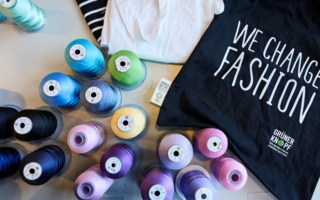09/10/2020 – Comment/editorial printed issue 9–12/2020 — auf Deutsch lesen
We’re on it!
“The coronavirus crisis is probably small in comparison to the extinction of species, climate change and the other environmental problems we are facing.” Dirk Steffens
Climate crisis, extinction crisis, covid-19 crisis. The world is in crisis mode, and so are the exhibition companies. Most recently, exhibition organiser Messe Frankfurt announced that, due to the pandemic, it would not be staging any physical events at its site in Frankfurt up to and including March 2021. This is a severe blow for Heimtextil 2021, which has been moved from its usual slot in January to a later date in May. Opening its doors from 4–7 May 2021, it will take place in Frankfurt concurrently with Techtextil and Texprocess 2021. It remains to be seen what impact this postponement will have on the global industry as a whole and what the exhibition will offer instead to bridge the gap.
Rest assured, we’re on it.
The same is true of our reporting on sustainability along the textile supply chain!
“The coronavirus crisis is probably small in comparison to major events such as the extinction of species, climate change and all the other environmental problems we’re facing,” says science journalist Dirk Steffens (cf. Journalist 9/September 2020). “If the climate changes, more species will die. If more species die, the climate will change. We’re acting as though climate change is the biggest problem we’re facing. This thinking is fundamentally wrong. [...] The climate crisis is threatening the way we live. But the extinction of species will determine whether we live or die.”
Along a similar vein, Germany’s Development Minister Dr Gerd Müller commented at a press conference in mid-July: “The exploitation of people and the environment, and child labour must not become the foundation on which our global economy and our prosperity are built.” In his book “Collapse”, bio-geographer Jared Diamond concludes that a civilisation’s ability to survive largely depends on its “intellectual and/or organisational agility when responding to environmental damage” (cf Überleben, Zukunftsfrage Artensterben, p.49).
Our environment and the damage it has sustained are now forcing us to respect minimum environmental and social standards. It makes sense.
After all, our desire to survive is surely beyond dispute.




